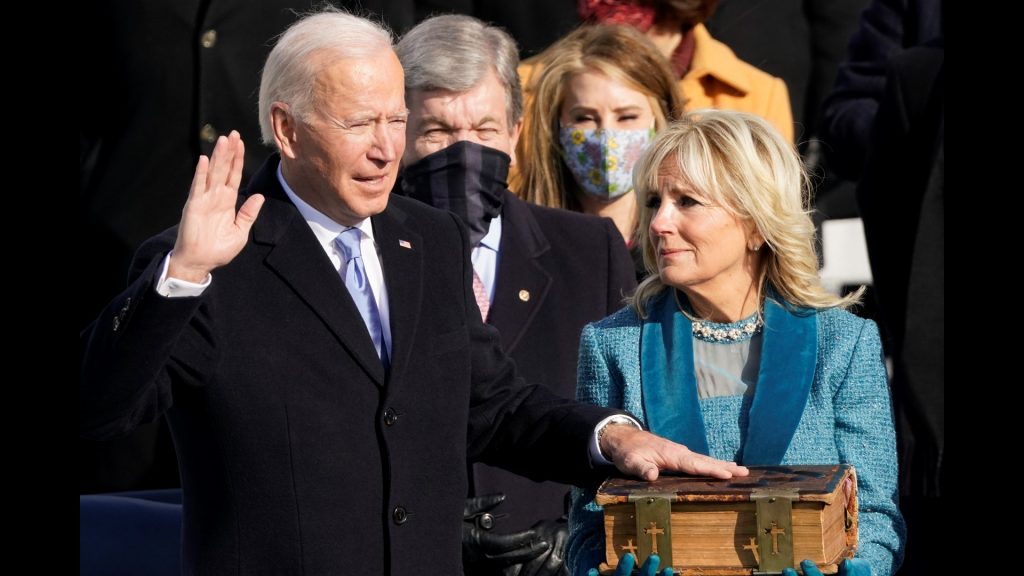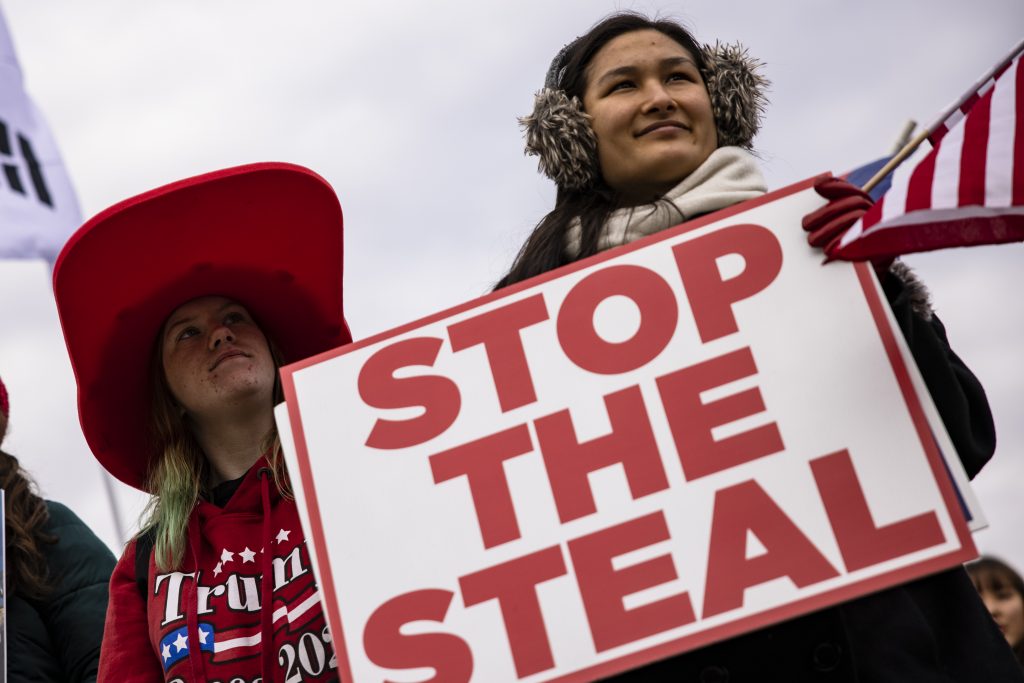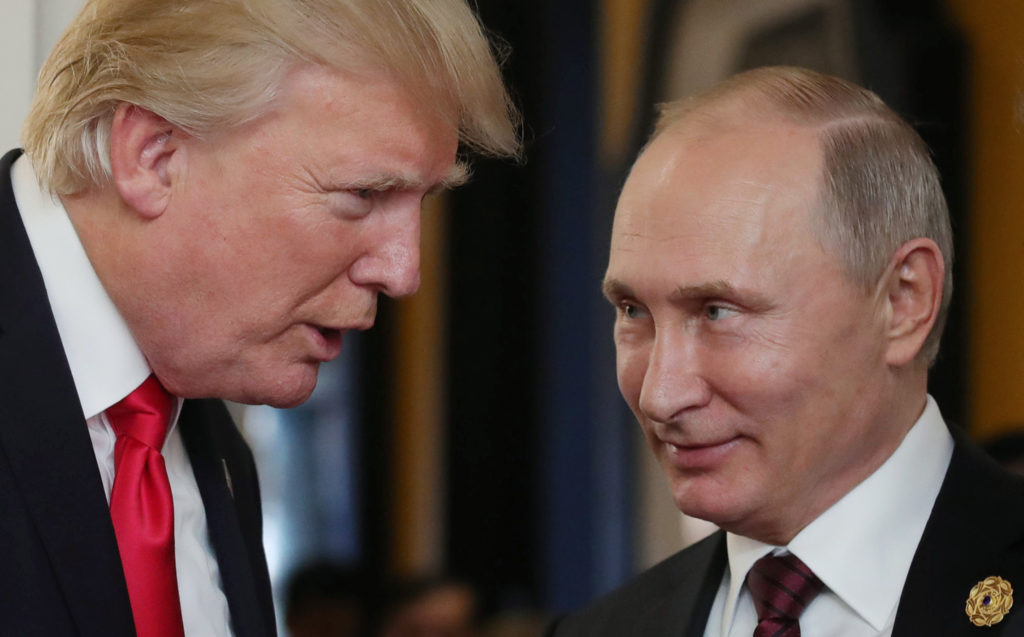Given the last four years, it’s difficult to remember that there have been times when there was genuine joy in American politics. And humor. And grace. Even accomplishment.
The real American story has always been one of re-invention and an attempt, as the great Preamble says, to form “a more perfect Union” where justice will be established, domestic tranquility ensured, the common defense provided for, the general welfare promoted, and the blessings of liberty granted to ourselves and those who follow us.
The last four years have strained to the breaking point those always aspirational goals. Strained, but not yet broken. It remains for each of us – really each and every one of us – to bind up the nation’s wounds, recommit to the essential American ideals and acknowledge that we really are all in this together.

As the new American president said this week, “without unity, there is no peace, only bitterness and fury. No progress, only exhausting outrage. No nation, only a state of chaos. This is our historic moment of crisis and challenge, and unity is the path forward.”
In the spirit of work to do and wounds to heal, let me suggest three essential objectives for myself and for others who are willing to do the work.
Commit to civic engagement and responsibility. I live in a very rural part of the American West, a place distant enough from a city to require individual effort to both sustain yourself and your place. Following a disastrous winter storm in 2007 – winds reached 147 miles per hour – electric power and telephone service was out for days on end. Property damage was in the millions and most people were woefully unprepared for the aftermath.
Human nature might have taken over and the seen the locals revert to form and not learn from the experience, but that didn’t happen. A committed group of local volunteers were determined to make sure the area was prepared when the next disaster struck. Powered exclusively by volunteers and with minimal governmental support an emergency volunteer corps was created, plans were made, a communication network built, supplies were stockpiled. Today nearly a dozen individual neighborhoods have their own emergency preparedness organization in place. Our neighbors recently donated several thousand dollars to acquire and store supplies, and since not everyone takes this kind of preparation seriously, we’ve made provisions to be prepared for them, too.
It’s a small example of what it means to commit to civic engagement and responsibility and what individuals can do when they do it together. No one told these volunteers to organize. The government didn’t mandate it. Good people wanted to do a good thing because, well, they’re good people. It’s the very essence of citizenship.
Commit to character in public life. “When the gap between ideal and real becomes too wide,” the historian Barbara Tuchman wrote, “the system breaks down.”
When the history of our times is eventually written, I suspect a very big chapter will grapple with how we chose to largely dismiss character as an essential ideal in public life. One definition of character is “moral or ethical quality,” the idea that public people behave in honorable, honest, compassionate ways.
We don’t need to tolerate serial lying from the mouths of public officials. And accepting fables when the lies comfortably reinforce our own beliefs is nothing more than lazy self-delusion. “In a time of deceit,” George Orwell observed, “telling the truth is a revolutionary act.”
Resist the temptation to dismiss all words from all public officials as untrustworthy. It’s a myth. Sure, all politicians shade and shape with language, but truth – and character – are the essentials in a society that hopes to govern itself and not descend to angry mob rule. Character really does count. Don’t tolerate people in public life that you wouldn’t welcome at your dinner table. Hold on to the reality that character counts and hold those who hold power accountable for their character.
Commit to living outside your bubble. It’s been suggested that we are living in a “post-truth era” where, as the writer Paul Valadier says, too many in positions of power and responsibility display a “shameful, cavalier attitude toward the facts and a contempt for the public.”

A post-truth era, should it persist, sounds the death knell for democracy. It’s a citizen’s responsibility to have more than opinions. There is also a requirement to seek and use real and honest information. As Jon Meacham, the biographer of Thomas Jefferson, wrote of the architect of so much of the American experience, “the pursuit of knowledge…coexists with the pursuit of pleasure.”
The denigration of journalists and long-established and credible news organizations is a companion tactic that amplifies the fact challenged “post-truth era.” Real journalists working to report real news, hold powerful people to account and expose corruption are guardians of democracy, not enemies of the people.
Here’s a test for all of us struggling to find good information in this time of disinformation. The next time you visit a website or read someone’s Facebook post ask yourself a simple question: prove it. Show me your source, not just your opinion.
One test I apply is to look for transparency. Every credible newspaper or news website – and you don’t have to agree or like everything in any publication – will offer a high degree of transparency. You can find out who owns the publication. The editors will be identified, and their contact information will be obvious. The best online sites acknowledge mistakes and make clear what they stand for. If this level of transparency isn’t obvious there is a reason for that. Think about why it doesn’t exist.
We except a lot – too much most of the time – from our leaders. Jefferson was brilliant and flawed. Franklin Roosevelt put American citizens in relocation camps, but also led the coalition that defeated fascist tyranny. Lyndon Johnson signed a civil rights act and engineered the tragedy of Vietnam. “Presidents and vice presidents are not wizards,” Tom Nichols wrote this week. “They cannot rewind history. They cannot single-handedly make us better people.” That’s our job, each and every one of us.
“Will we rise to the occasion, is the question,” Joe Biden said this week. “Will we master this rare and difficult hour? Will we meet our obligations and pass along a new and better world to our children?” Whatever you think of our new president and his abilities or deficiencies, he alone won’t make the country what it should be. We each have a piece of the American obligation. Let’s go back to being serious about it.
—–0—–
Additional Reading:
A few items worth a look…
Goodbye to Donald J. Trump, the man who wanted to be Conrad Hilton but turned out to be Paris Hilton
Kevin D. Williamson pens a final, brutal kiss off to the former president in what was once considered “the Bible” of American conservatism – The National Review.
Here he goes:
“Donald Trump is, in fact, the first president since Herbert Hoover to lead his party to losing the presidency, the House, and the Senate all in a single term. Along with being the first president to be impeached twice and the first game-show host elected to the office, that’s Trump’s claim to the history books. Well, that and 400,000 dead Americans and the failed coup d’état business.”
It gets better. Link here.
After The Sacred Landslide
David Roth has been known primarily for his writing on sports, but he’s also given voice to trying to define the Trump Era in cultural and social ways. His latest:
“One of the most important things to know about Trump is that he never has a plan. He barely has an itinerary. He simply moves from one flubby gilded hustle to the next, dedicating each moment to whatever feels good or whatever he thinks looks strongest. What mess he leaves behind is by definition not his problem, and he’s always already somewhere else by the time the stain sets. Trump is used to having other people do what he says, because he is richer and more powerful than them; that people have almost always done just that has made him soft and weak and strange, but also it has seldom led to him being seriously inconvenienced. He’ll call that a win.”
From Russia With Love
We may never know the full story of the curious case of Putin and Trump, but my instincts tell me that we will eventually have most of the details of what certainly was not “the Russian hoax.”

Luke Harding in The Guardian:
“Russia would have preferred it if Trump had won the election. Despite Joe Biden’s clearcut victory, though, the Russian leader has much to celebrate. Over four polarising years Trump accomplished many of the KGB’s longstanding goals. These included estranging the US from its western allies and Nato; deepening domestic strife; and waging a Putin-style disinformation campaign against the 2020 result.”
Link to the story here.
Paula Hawkins on Patricia Highsmith
I’m a long time fan of Patricia Highsmith and particularly her book Strangers on a Train (and the motion picture of the same name.)
Novelist Paula Hawkins has a great essay on the, well, quirky author.
“Highsmith—who had an unhappy childhood, who suffered, as an adult, from depression, anorexia and alcoholism, who was deeply misanthropic—was not as a writer particularly interested in happiness. Contentment, she suspected, was often a sign of stupidity; well-balanced people must be, at best, mediocre. Nor was she interested in the simplicity of popular morality, but was fascinated by the idea that all of us carried within us the capacity for good and ill, that identity was not fixed, but shifting, that a sort of dualism existed in all of us.”
A Brief History of Peanut Butter
Come on you know you want to know about this…
“Though the United States lags behind China and India in peanut harvest, Americans still eat far more of the spread than the people in any other country: It’s a gooey taste of nostalgia, for childhood and for American history. ‘What’s more sacred than peanut butter?’ Iowa Senator Tom Harkin asked in 2009, after a salmonella outbreak was traced back to tainted jars. By 2020, when Skippy and Jif released their latest peanut butter innovation—squeezable tubes—nearly 90 percent of American households reported consuming peanut butter.”
Get the full spread here.
Stay safe. Thanks for reading.
